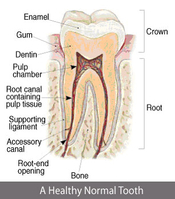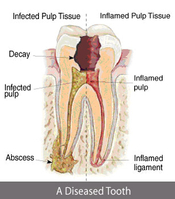|
What is Endodontic Treatment?
Endodontic treatment removes infection from the inside of your tooth. Underneath the hard enamel and the dentin of your tooth is a soft tissue called the pulp. The pulp contains blood vessels, nerves, and connective tissue.
The pulp extends from the crown of the tooth to the tip of the roots where it connects to the tissues surrounding the root. The pulp is important during a tooth’s growth and development, but once a tooth is fully mature it can stay in place without the pulp. Your teeth stay attached via the supporting ligament (or periodontal ligament).
 
Why Would I Need an ndodontic Procedure?
Endodontic treatment is necessary when the pulp, the soft tissue inside the root canal, becomes inflamed or infected, or when the pulp dies. The inflammation or infection can have a variety of causes: deep decay, repeated dental procedures on the tooth, or a crack or chip in the tooth. In addition, an injury to a tooth may cause pulp damage even if the tooth has no visible chips or cracks. If pulp inflammation or infection is left untreated, it can cause pain or lead to an abscess.
What is Endodontics?
Endodontics is the branch of dentistry dealing with the cause, diagnosis, prevention, and treatment of diseases of the dental pulp, usually by removal of the nerve and other tissue of the pulp cavity and its replacement with suitable filling material; pulp canal therapy; root canal therapy.
Endodontists are dentists with advanced post-graduate training in this field. Although general dentists can perform endodontic treatment, patients are referred to an endodontist when the case is complicated or more difficult than usual.
How Would I know that I Need an Endodontic Treatment?
Signs include: pain, prolonged sensitivity to heat or cold, tenderness to touch and chewing, discoloration of the tooth, and swelling, drainage and tenderness in the lymph nodes as well as nearby bone and gingival tissues. Sometimes, however, there are no symptoms.
How Does Endodontic Treatment Save the Tooth?
The dentist removes the inflamed or infected pulp, carefully cleans and shapes the inside of the canal, a channel inside the root, then fills and seals the space with Gutta-Percha. Your dentist afterwards will place a crown or other restoration on the tooth to protect and restore it to full function. After treatment, the tooth continues to function like any other tooth.
What is Gutta-Percha?
Gutta-percha is the purified coagulated exudate from a tree, commonly called the "mazer wood" tree, of the Malaysian archipelagos. The substance is similar to that of the rubber tree, which is then processed to obtain the dental compound. This is the only ADA approved material to be used as a filling in root canals.
How Much Time Will A Root Canal Take?
Root canals can be done in one, two or multiple appointments, depending on the tooth, how many roots there are, the current conditions of the tooth, the accessibility to area, the canals, and time available. Each visit or appointment can take from under 1 hour, to over 2 hours.
What is an Abscess?
An abscess is a localized collection of pus (infection) within a tissue or a confined space.
Does Every Abscessed Tooth Hurt?
No. Some abscessed teeth can be pain-free, which are most commonly found and diagnosed accidentally by a dentist, usually through a dental x-ray and exam. Whenever possible, the recommended treatment is a root canal.
What Happens When an Infected Dental Pulp is not Treated?
The infection will continue its progress, extending from the confines of the dental pulp and involving the surrounding tissues, such as the root, the bone, the gums etc. A progressing infection could easily involve facial spaces and the patient would then start observing swelling of the face. Such condition could become life threatening if left unattended.
Do I Need to Take Antibiotics Every Time a Root Canal is Done?
Not always, today we are very conservative in determining the need for an antibiotic. It is usually determined by the dentist on an individual basis, per case, per tooth. Usually, if there are systemic signs and symptoms such as swelling, fever, generalized sense of malaise (ill feeling), and/or lymph node tenderness, then an antibiotic will be prescribed. The common toothache even when it is associated with a minor localized infection or abscess will not automatically require an antibiotic. Since a high number of cases will respond favorably to the dental treatment, antibiotics are not prescribed on a preventive basis.
Since Treatment Was Done, My Tooth No Longer Hurts. May I Start Chewing On It?
It is not recommended to start chewing on the tooth immediately after the root canal treatment. Most times it will be very tender, but even if it is not painful to chew, you should avoid chewing on it until the crown of the tooth is properly restored (repaired) by your dentist. The sooner you see your dentist; the sooner you will be able to re-start normal function on the tooth.
What Happens if I Wait Longer Than Recommended to Get the Crown of the Tooth Permanently Repaired?
If the remaining tooth structure is not properly and permanently covered and protected, your tooth could fracture and not be salvageable at all. The bacteria in saliva, as well as food debris, can go between the temporary filling and the tooth surface and contaminate the root canal treatment. This may cause treatment failure. If a re-infection occurs, often, another root canal treatment will need to be done (endodontic retreatment). If the damage is very extensive, extraction should be considered.
What are the Benefits of Root Canal Therapy Versus Extraction?
The single most important benefit of root canal therapy is that you keep your tooth. Extraction may lead to other dental problems. For instance, drifting of teeth, bite problems, TMJ pain, and the need to treat adjacent teeth that do not otherwise need dental treatment in order to restore the missing tooth.
How successful are Root Canals?
Root canal treatment has a high degree of success if done properly by a trained skilled professional. The success of root canal therapy is equally dependent upon the technical skill of the doctor, as well as the follow through of the patient, to have the tooth immediately restored.
What is Resorption?
Resorption is a physiologic or pathologic condition associated with loss of bone, cementum and/or dentin. There are different types of resorption such as external, internal, inflammatory, replacement and surface. Its etiology is unknown, even though it commonly is associated with trauma.
- External: a pathologic process that initiates from the periodontium affecting the external surface of the tooth. Can be further classified by location: cervical, lateral or apical. Or type: surface, inflammatory or replacement.
- Internal: a pathologic condition that initiates within the pulp causing loss of dentin and sometimes, cementum. It may or may not perforate the external root surface.
- Inflammatory: a pathologic loss of bone, cementum and dentin in the root.
- Replacement: Also known as ankylosis, it is a pathologic loss of cementum, dentin and periodontal ligament with simultaneous ingrowth and fusion of bone to the tooth surface. A loss of the physiologic mobility is common.
- Surface: a physiologic condition causing small surface defects in the cementum and dentin that are usually self-repaired by deposition of new cementum in the defect.
What is Endodontic Retreatment?
Retreatment is a term used to describe a procedure when a root canal has to be redone. The reason for retreatment is because germs or bacteria in the mouth have re-entered the tooth, usually due to decay. A patient may experience pain to biting or swelling. Sometimes, a patient may have no symptoms and your dentist sees something on the x-ray that shows a root canal has not healed and advises a patient to see a root canal specialist for an evaluation.
What is an Apicoectomy?
This is an endodontic micro-surgical procedure for a tooth that has had a root canal. The purpose is to remove persistent infection at the end of a root and seal the root end to prevent re-entry of bacteria. This procedure also provides the opportunity to detect possible root fractures.
How Long Will I Be Numb After Root Canal Treatment?
The numbness will last for several hours after your treatment. It is best to avoid chewing until the local anesthesia has completely disappeared to prevent accidentally biting your lip, cheek, or tongue. It is okay to drink or to use a straw to have liquids after treatment.
Why Do I Still Feel My Tooth if I Had Root Canal Therapy? I Thought My Tooth Was Dead.
A tooth that has had a root canal is not "dead". It is still considered a "live" or vital part of your body. There are nerve endings that are present in the jawbone underneath the tooth, as well as nerves that attach from the jawbone to the tooth. This is why there is still feeling in a tooth that has had root canal therapy.
Will I Feel Pain During or After the Procedure?
Dr Antonious is dedicated to providing root canal treatment that is painless and comfortable. Our entire team goes out of their way to make you feel at ease.
For the first few days after treatment, your tooth may feel sensitive, especially if there was pain or infection before the procedure. This discomfort can be relieved with over-the-counter or prescription medications. Follow the directions on the bottle.
Your tooth may continue to feel slightly different from your other teeth for some time after your endodontic treatment is completed. However, if you have severe pain or pressure, swelling or pain that lasts more than a few days, please call us.
Will the Tooth Need Any Special Care or Additional Treatment After Endodontic Treatment?
You should not chew or bite on the treated tooth until you have had it restored by your dentist. The tooth is susceptible to fracture and should be restored to health (usually with a crown) as soon as possible. Then you just need to practice good oral hygiene, including brushing, flossing, and regular checkups and cleanings.
Most endodontically treated teeth last as long as other natural teeth. In a few cases, a tooth that has undergone endodontic treatment does not heal or the pain continues. Occasionally, the tooth may become painful or diseased months or even years after successful treatment. Often when this occurs, removing the previous endodontic filling, medicating the canals, then placing a new endodontic filling can save the tooth.
What Causes an Endodontically Treated Tooth to Need Additional Treatment?
New trauma or cracks, deep decay, or a loose, cracked or broken filling can cause new infection in your tooth. In some cases, we may discover, using a microscope, that there are additional very small and/or curved canals that could not be found or treated during the initial procedure.
Can All Teeth be Treated Endodontically?
Most teeth can be treated. Occasionally, a tooth cannot be saved because the root canals are not accessible or the root is severely fractured. However, advances in endodontics are making it possible to save teeth that even a few years ago would have been lost. When endodontic treatment is not effective, endodontic surgery may be able to save the tooth. Some teeth are so broken down or decayed that they cannot be restored or do not have adequate bone support, so while a root canal could be performed, the long-term prognosis of the tooth due to other factors, makes spending money on a root canal a poor investment.
Will I be Able to Drive and go Back to Work After My Root Canal Treatment?
Yes. A local anesthetic is used for root canal treatment just like it is used for your general dental work, like fillings and crowns. When you leave the office, you will be numb for 1 to 3 hours. Going back to your daily activities should be of no concern. Surgical endodontic treatment may involved more healing time and require rest at home for the remaining part of the day.
What if I Need to Talk to Dr. Antonious After Working Hours?
You are welcome to call our office after hours. Our answering service will contact Dr. Antonious immediately and he will call you as soon as possible.
| 


